Prostatitis is a condition in which the prostate gland becomes inflamed, accompanied by a burning sensation when urinating and impaired urinary function. Hyperplasia is characteristic of adenomas or benign tumors. In some cases, the pathology becomes malignant and cancer develops. The disease is common in patients over 40 years old. But it can develop at a younger age if a person does not adhere to a healthy lifestyle, is sedentary or eats poorly. Therefore, treatment requires not only medication but also a gentle diet and proper nutrition.
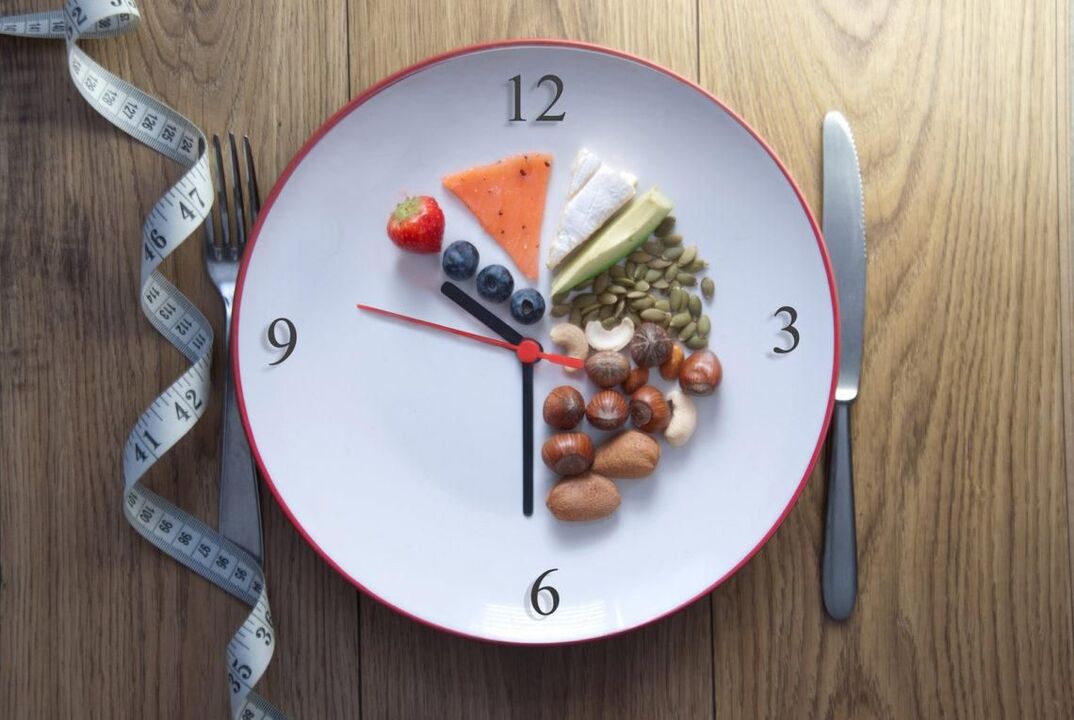
Dietary requirements
In case of prostatitis, additionally adhere to a reasonable diet.It is needed for the following purposes:
- eliminates constipation, which causes increased pain and impedes blood circulation in the pelvic organs;
- eliminates intoxication in the body, which occurs when feces are stored for a long time in the intestines, where putrefactive bacteria develop;
- improves intestinal motility and the entire digestive process.
To improve all functions of the digestive tract, you should add the following foods rich in plant fiber to your diet:
- berries, fruits, vegetables, herbs;
- cereals, bran, fresh juice.
If prostatitis develops, blood vessels are also affected. They are in a constricted state and thus obstruct local blood flow. Cell hypoxia develops so they begin to become inflamed and die. Blood flow is disrupted not only in the prostate but also in other pelvic organs. This causes the development of edema and ascites may form.
To restore blood flow through the pelvic organs, complex treatment is required. They use medication, physical therapy, physical activity, and diet. The diet includes fatty acids that help improve blood circulation, the functioning of the reproductive system and testosterone production.

If a man has prostatitis, additional pathologies may develop:
- diabetes;
- atherosclerosis.
Therefore, when the disease develops, you should review your diet and limit foods high in glucose and cholesterol.
Dietary characteristics
To improve men's health, the body must receive adequate amounts of vitamins, trace elements and minerals to help improve the function of the urinary and reproductive systems.The following elements are required, standards are allocated to men aged 18-50 years:
- zinc - 30 mg;
- selenium - 7 mcg.
To replenish the correct proportions of trace elements in the body, consume the following foods:
- seafood - shrimp, mussels, oysters;
- algae, seaweed, sea fish;
- quail, chicken eggs.
Many urologists recommend replacing chicken eggs with quail eggs. They contain a minimum amount of cholesterol but contain the maximum amount of vitamins and trace elements.
Table of foods containing large amounts of selenium.
| Product Groups | Types of food |
| Egg | quail |
| Meat products | Beef, rabbit, pig liver |
| Seafood | Oysters, squid, scallops, octopus |
| pea's tree | Beans, peas, lentils |
| Cereal | Oats, buckwheat, corn or barley |
| Oil | Olives, flax seeds |
| Nuts | Cedar, walnut |
Table of foods containing zinc.
| Product Groups | Types of food |
| Seafood | Types |
| Nuts | Watermelon, pumpkin, sesame, nuts |
| Meat products | Beef, lamb, liver |
| Fish | Types |
| Egg | Yolk |
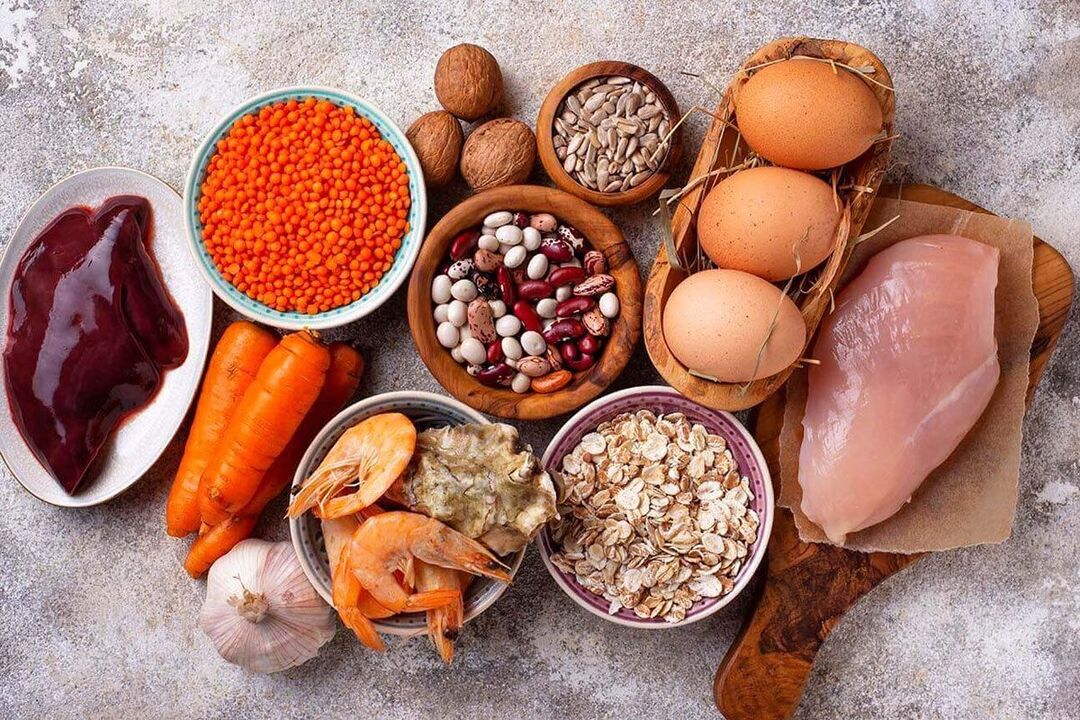
Even if you eat plenty of foods containing selenium and zinc, you may still not get the levels you need. This is due to impaired bowel function. In that case, you should buy multivitamin preparations containing these substances. Doctors advise using drugs that concentrate not only vitamins, but also antioxidants. They remove free radicals and toxic products from the body and stimulate the renewal of cellular components.
To boost testosterone production and regulate estradiol levels, consume foods rich in vitamin E.It has the following features:
- removes free radicals, toxins and waste from the body;
- improves absorption of vitamins and trace elements;
- restores damaged tissues after a severe inflammatory process.
To prevent recurrence, follow the diet consistently.
Nutritional principles
To help the body cope with the disease faster, adhere to the following principles in the diet:
- Count the total amount of food in a day, divided into 5-6 meals, so that a person consumes no more than 300 g of food at a time;
- develop a meal schedule to improve the production of digestive enzymes, absorption of nutrients and prevent the development of constipation;
- It is forbidden to consume any liquids a few hours before bedtime and throughout the night to prevent swelling and strengthen the functioning of the urinary system;
- diet based on foods rich in protein, fruits, vegetables, cereals, high-quality oils;
- Reduce carbohydrate intake to a minimum.
Many men with chronic prostatitis are overweight or obese. They then consult with a gastroenterologist or nutritionist, who will choose optimal nutrition and a strict diet. This applies to men whose weight exceeds 100 kg. Obesity puts additional stress on the prostate, so the organ's function is reduced even more. This makes treatment difficult or completely ineffective.
Exclude products
If a man suffers from prostatitis, the following foods and spices used in the daily diet should be excluded:
- large amounts of salt, causing fluid retention in the body, leading to swelling, including of the prostate;
- spices, seasonings, marinades, pickles, homemade preparations - increase tissue swelling and lead to the accumulation of subcutaneous fat;
- fish eggs, canned food, sausages, salted cheese;
- chocolate, confectionery glaze, other cocoa products;
- lemonade, soda;
- breads, baked goods, sauces;
- The product contains many chemicals, emulsifiers, dyes, stabilizers, carcinogens, preservatives;
- Dairy products have a long shelf life, over 7 days.
If you do not reduce the amount of this product, fluid will continue to accumulate, which will increase the compressive force on the inflamed tissues. The inflammatory process will gradually worsen, local blood circulation will become difficult and the condition will begin to worsen and become more complicated.
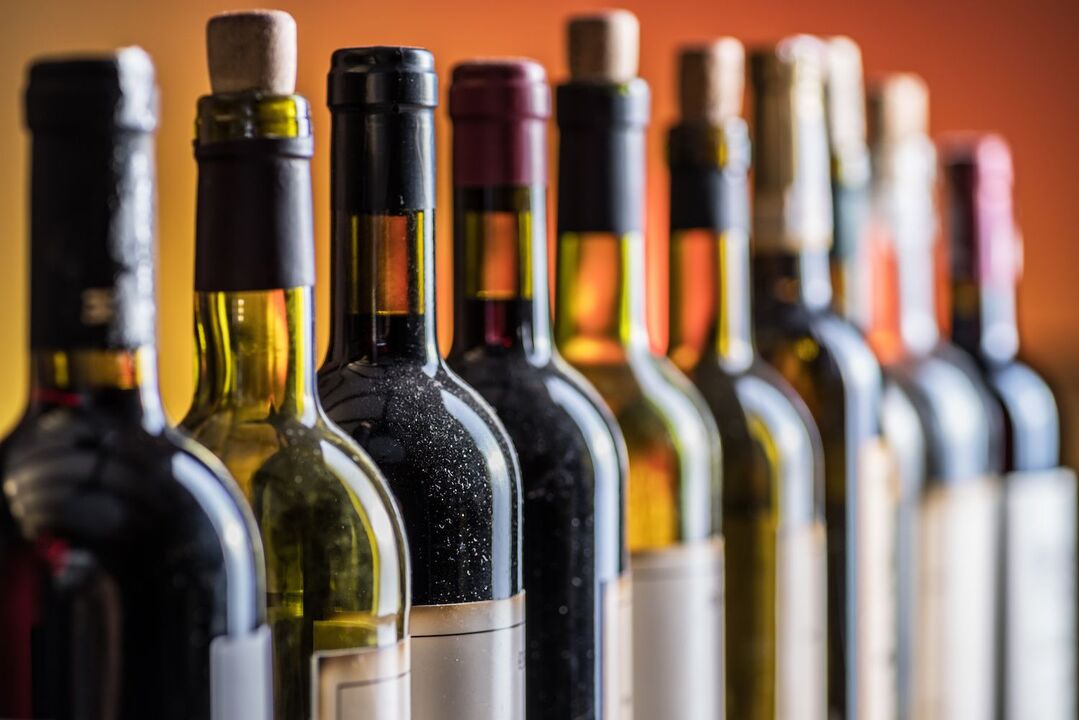
Attention! Any type of alcoholic beverage is prohibited. Especially if this is associated with an exacerbation, you should not use them in any dosage. Ethyl alcohol negatively affects the entire circulatory system and impedes blood circulation. This aggravates the condition of the prostate during inflammation. Acute hypoxia develops and nutrient supply decreases. Gradually, the man becomes infertile, impotent and the adenoma turns malignant.
As soon as the period of exacerbation ends, the condition becomes chronic or in remission, it is allowed to add small amounts of the product:
- dark chocolate, cocoa;
- high-purine vegetables, peas, beans;
- ventricle, beef liver.
Some patients in remission or chronic prostatitis drink alcohol.Then they must follow the rules:
- Use only high quality alcohol;
- It is forbidden to drink ethyl alcohol on an empty stomach;
- use protein-rich snacks;
- Observe how you feel, if pain or dizziness occurs, stop drinking alcoholic beverages;
- Use the minimum dosage so as not to poison the body.
To prevent intoxication and exacerbation of prostatitis, the minimum dosage regulations for various types of alcoholic products should be observed:
- vodka - up to 150 ml;
- beer - no more than 0. 5 l;
- wine - no more than 200 ml.
Alcoholic beverages are allowed to be consumed no more than 1-2 times a month. Strictly follow the prescribed dosage.
Consumable products
When sick, the body needs foods with the maximum amount of trace elements and vitamins. They use foods with a large amount of protein and a minimum amount of carbohydrates and fats. Eat the following foods that contain small amounts of healthy fats:
- olive oil, flaxseed, pumpkin oil;
- low-fat sour cream;
- a small piece of lard, used once a month.
Animal fats are not recommended because they contain large amounts of cholesterol. It can hinder blood circulation due to the accumulation of cholesterol plaques that clog blood vessels. So, before cooking meat, remove the skin and layer of fat.
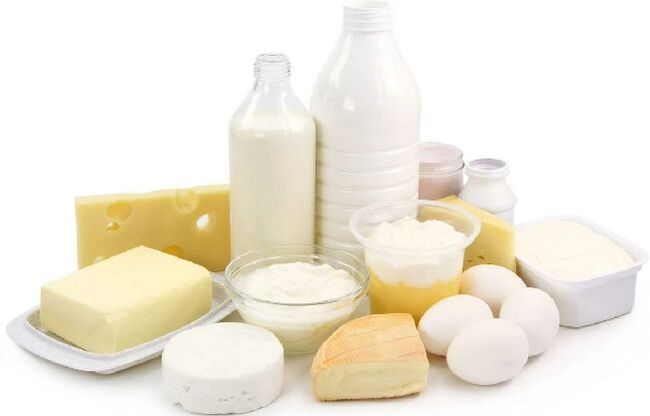
Recommendations for protein consumption:
- eat small amounts of chicken, which contains purines that quickly accumulate in the body;
- Basically, the diet should contain rabbit, beef, and lamb;
- add small amounts of egg whites and natural dairy products;
- Fish of any type, should be consumed at least 2-3 times a week.
To increase the proportion of protein in the diet, eat nuts and seeds. But they are used only at the end of the acute phase of the inflammatory process. Dairy products are used daily to supplement calcium and other nutrients.
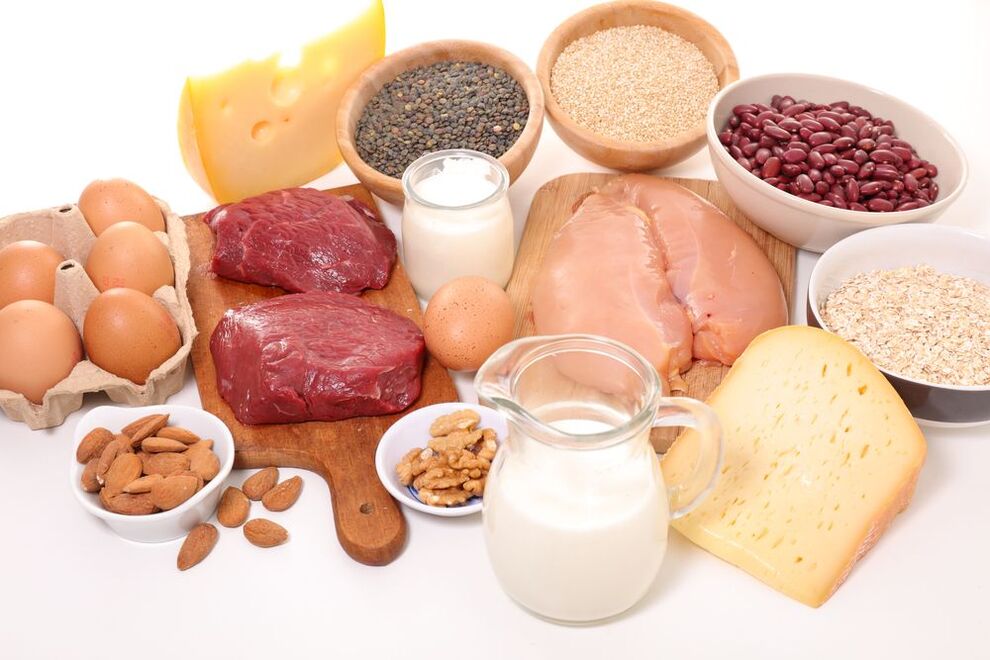
Among all foods rich in carbohydrates, only the following foods are allowed:
- dried fruits, berries, fruits;
- cereals, cereals, starchy vegetables;
- sweets in the form of jelly or marmalade.
Doctors remind you to limit your intake of foods high in starch. It leads to constipation and increased inflammation in the prostate. So, among all starch products it is allowed to use cucumbers, eggplants, garlic, tomatoes. They are quickly absorbed, saturating the body with vitamins and trace elements, while preventing stress to the digestive tract and the development of constipation. Gradually, the blood vessels are cleaned and toxins are removed.
It is strictly forbidden to fry, grill, or smoke food. It must be boiled, steamed, stewed. Add a minimal amount of salt and exclude spices.
Nutritional menu for prostatitis
The table shows the approximate diet for a week.
| Day | Breakfast | Lunch | Dinner | Afternoon snack | Dinner | Late dinner |
| Firstly | Oatmeal with milk 150 g, carrot juice 100 ml, vegetable salad 100 g | Vegetable puree 150 g | Tomato and cucumber salad with olive oil 100g, boiled fish in tomato sauce 200g, rosehip decoction 150g | Kefir 150 ml, crackers 3 pieces | Steamed beef cutlet, two pieces, 100 g hard pasta, 150 ml mineral water | Kefir 150ml |
| Monday | 200g barley porridge, 1 banana, 100 ml orange juice | 2 boiled eggs | Borscht in vegetable broth 200 ml, grilled chicken breast with vegetables 200 g, dried fruit juice 150 ml | Small amount of dark chocolate, 150 ml milk | Seafood salad with vegetables 200 g, rosehip decoction 150 ml | Low-fat yogurt 200ml |
| The third day | 150 g porridge, 200 ml weak tea, 2 biscuits | fruit slices | Fish soup 200 g, chopped vegetables with boiled chicken 200 g, juice 150 ml | Fruit jelly 150 g, biscuits 3 pieces | Steamed meatballs with sweet peppers and tomatoes 200 g, herbal tea 150 ml | Ryazhenka 150ml |
| Wednesday | Buckwheat porridge with milk 200 g, dried fruit, green tea 150 ml | Different types of nuts | Pumpkin puree soup with rye bread 200 g, apple juice 200 ml | Oven-baked cheesecake 200 g, berry juice 150 ml | Steamed cod 150 g, vegetables 150 g, strawberry jelly 100 ml | Kefir 150ml |
| Thursday | Corn porridge with milk 200 g, unsalted cheese 2 slices, black tea 150 ml | Baked apple | Steamed beef cutlet, 250 g hard noodles, 150 ml green tea | Curd with raisins 150 g | Rabbit meat stewed with low-fat sour cream 200 g, sliced vegetables 100 g, mineral water 150 ml | Ryazhenka 150ml |
| Friday | Steamed omelette with 3 eggs, 150 ml fresh orange juice | Fruit slices 200g | Chicken soup 150 g, lamb stew 150 g, vegetable puree 100 g, juice 150 ml | Pumpkin seeds | Salmon cutlets 2 pieces, boiled buckwheat 150 g, chamomile tea 150 ml | Milk 150 ml |
| Saturday | 150 g oatmeal, 1 boiled quail egg, 150 ml apple juice | Fresh fruit 150 g | Pilaf with lamb 200 g, dried fruit jam 150 ml | 150 g curd, 150 ml black tea | Boiled beef 100g, stewed cabbage 100g, green tea 150ml | Fresh vegetable juice 150ml |
If you follow the rules of the prescribed diet, you can alleviate a person's condition with prostatitis. A reasonable diet helps prevent recurrence and reduces swelling and inflammation in the prostate. Recovery is faster and you may reach remission in a short period of time. But we must not forget to treat it with medication prescribed by a doctor. Diet is an auxiliary method that needs to be prescribed by a urologist or nutritionist depending on the patient's medical history and body characteristics.






























